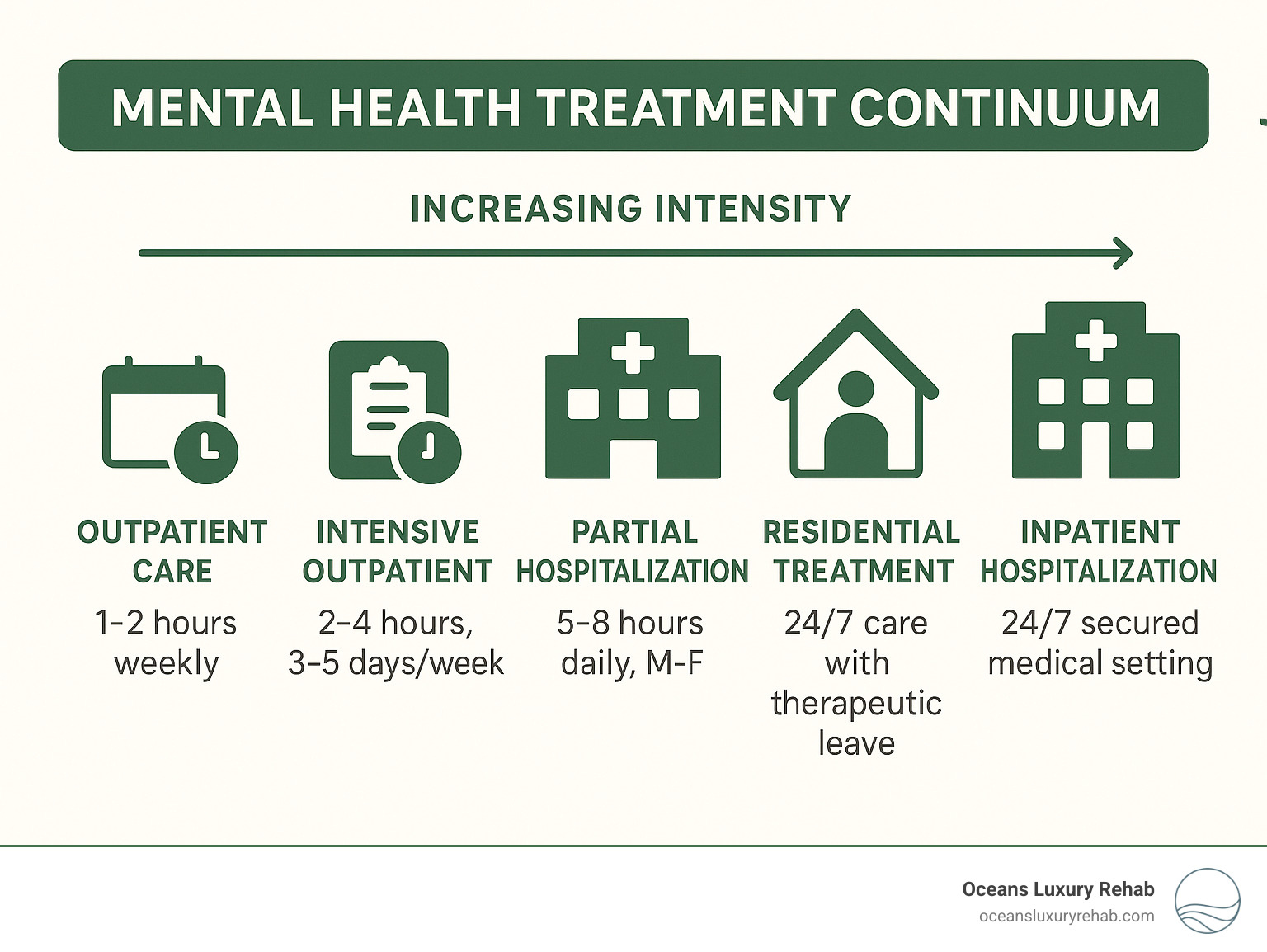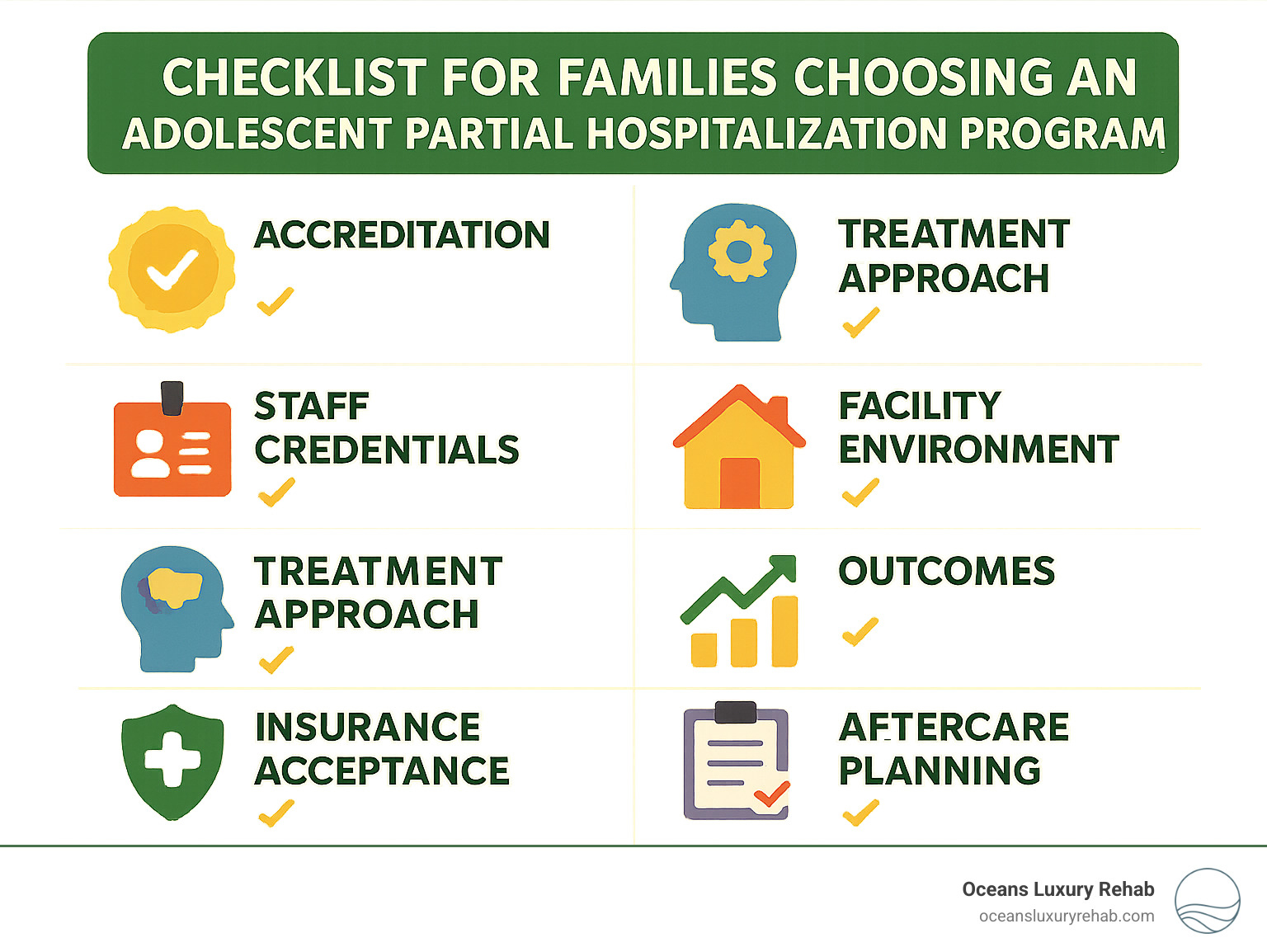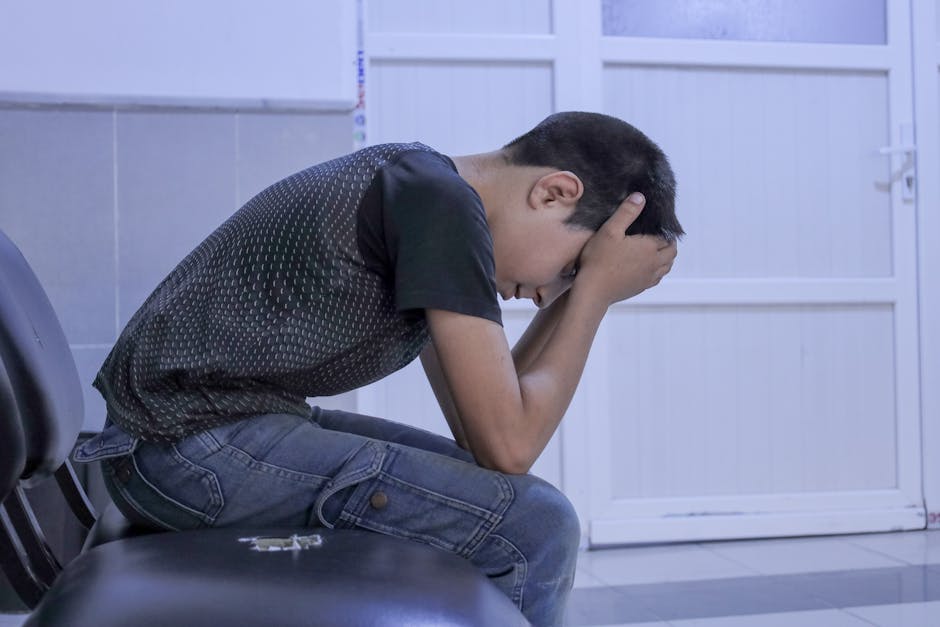Understanding Adolescent Partial Hospitalization Programs
An adolescent partial hospitalization program (PHP) is an intensive, structured day treatment option for teens experiencing significant mental health challenges that fall between outpatient therapy and inpatient hospitalization in terms of care intensity.
What is an Adolescent PHP?
- Definition: A therapeutic day program providing 5-8 hours of daily treatment without overnight stays
- Age Range: Typically serves youth ages 12-18 (sometimes up to age 20 if still in high school)
- Treatment Duration: Usually 1-6 weeks, depending on individual needs
- Schedule: Monday-Friday daytime hours (usually 8:30am-3:30pm)
- Core Services: Group therapy, individual therapy, family therapy, medication management, academic support
- Common Conditions Treated: Depression, anxiety, suicidal thoughts, self-harm, mood disorders, trauma responses, eating disorders
Adolescent PHPs serve as both a step-down option for teens transitioning from inpatient care and a step-up intervention for those who need more support than traditional outpatient therapy can provide. The key benefit is that teens receive intensive therapeutic support while still returning home each evening, maintaining family connections and practicing new skills in real-world settings.
“We know how overwhelming it is to watch your teen struggle with serious mental health challenges or risky behaviors,” says one program director. “PHPs provide teens with effective treatment for severe mental health conditions with the flexibility to return home to family in the evening.”
I’m Clint Kreider, a Clinical Psychologist with eight years of experience in private practice and five years working in addiction treatment, including adolescent partial hospitalization programs where I’ve helped teens and families steer mental health crises through structured therapeutic interventions.

Adolescent partial hospitalization program terms simplified:
What Is an Adolescent Partial Hospitalization Program?
Imagine a place where teens can receive intensive mental health support during the day, then return to the comfort of their own beds each night. That’s exactly what an adolescent partial hospitalization program offers – a perfect middle ground between weekly therapy appointments and full hospitalization.
These programs provide structured, comprehensive care during daytime hours while allowing teens to maintain their connection to family and home life. It’s like getting the best of both worlds: serious clinical support and the normalcy of sleeping in your own bed.
Recent research backs up what we’ve seen at Oceans Luxury Rehab. A 2024 study in the Journal of the American Academy of Child & Adolescent Psychiatry found that PHPs significantly improve mental health outcomes for teens after they complete the program. The secret sauce? Evidence-based therapies delivered in a concentrated, daily format.
Our adolescent partial hospitalization program blends several proven therapeutic approaches. We use Dialectical Behavior Therapy (DBT) to build skills in managing emotions and relationships. Cognitive Behavioral Therapy (CBT) helps teens recognize and shift unhelpful thought patterns. We incorporate Acceptance and Commitment Therapy (ACT) to help young people accept difficult feelings while making positive changes in their behavior. For those who’ve experienced trauma, we offer specialized trauma-focused therapies. And because not everyone connects with traditional talk therapy, we include experiential therapies like art, music, and movement.
When teens join our program, they’re working toward several key goals: stabilizing any crisis situations, reducing troubling symptoms, improving emotional regulation, enhancing family communication, keeping up with academics, and preparing for the next step in their recovery journey. Most teens stay in our adolescent partial hospitalization program for 1-4 weeks, though we can extend this based on individual needs.
Eligibility, Diagnoses, and Core Services
Age Range and Eligibility
Our adolescent partial hospitalization program typically serves young people between 12 and 18 years old, though we sometimes work with individuals up to age 20 if they’re still in high school.
To benefit from our program, teens need to be able to return home safely each evening, participate in group settings, engage in treatment voluntarily, and show significant struggles in school, home, or social environments. We often work with teens who haven’t found enough relief through standard outpatient therapy.
Common Diagnoses Treated
At Oceans Luxury Rehab, our adolescent partial hospitalization program helps teens dealing with a wide range of mental health challenges. We regularly work with young people experiencing depression, various anxiety disorders, bipolar disorder, PTSD, self-harm behaviors, and suicidal thoughts.
We also support teens struggling with school refusal, eating disorders including ARFID (Avoidant/Restrictive Food Intake Disorder), and those with co-occurring substance use issues. Research published in the International Journal of Eating Disorders has shown that PHPs are particularly effective for treating adolescents with ARFID, with improvements that last long after treatment ends.
Core Services
When your teen joins our adolescent partial hospitalization program, they’ll receive comprehensive care from a team of specialists. This includes thorough assessment by our multidisciplinary team, regular medication check-ins with a child/adolescent psychiatrist, one-on-one therapy sessions, skill-building group therapy, and family therapy sessions.
We also provide education for parents and caregivers, academic support to keep teens connected to their schoolwork, case management to coordinate various aspects of care, and thoughtful discharge planning to ensure a smooth transition when it’s time to step down to less intensive treatment.

A Typical Day in an Adolescent Partial Hospitalization Program
Parents and teens often wonder what actually happens during the day in our program. Here’s a glimpse into a typical day at our adolescent partial hospitalization program:
The morning begins with a check-in at 8:30 AM, where teens share how they’re feeling, set goals for the day, and take any needed medications. From there, they move into a DBT Skills Group until 10:30 AM, learning practical techniques for managing emotions, practicing mindfulness, and handling distress.
Mid-morning brings individual therapy sessions, where teens work one-on-one with their therapist on personal challenges and goals. Lunch follows at 11:30 AM, which doubles as a chance to practice social skills and build connections with peers in a supportive environment.
After lunch, teens spend an hour on academics, working on assignments from their home school with educational support from our staff. The afternoon continues with experiential therapy – whether that’s expressing emotions through art, finding comfort in music, or engaging in movement activities like yoga.
The day wraps up with a process group from 2:30 to 3:30 PM, where teens reflect on their day, share challenges and victories, and create safety plans for the evening. They also receive practice assignments to reinforce skills at home.
Throughout this structured day, our compassionate team provides guidance, feedback, and encouragement. We provide meals and snacks, and transportation may be available depending on your location.

PHP vs IOP, Residential, and Outpatient Care
Understanding where an adolescent partial hospitalization program fits in the bigger picture of mental health care can help you make the right choice for your teen. Think of it as a spectrum of support, from least to most intensive:
| Level of Care | Hours/Week | Overnight Stay | Key Features | Best For |
|---|---|---|---|---|
| Outpatient | 1-2 hours | No | Weekly therapy sessions | Mild symptoms, strong support system |
| Intensive Outpatient (IOP) | 9-12 hours (3-4 hours, 3 days/week) | No | Group and individual therapy | Moderate symptoms, step-down from PHP |
| Partial Hospitalization (PHP) | 25-40 hours (5-8 hours, 5 days/week) | No | Comprehensive daily treatment | Severe symptoms, ability to function at home evenings/weekends |
| Residential Treatment | 24/7 | Yes | Round-the-clock therapeutic environment | Severe symptoms requiring constant supervision |
| Inpatient Hospitalization | 24/7 | Yes | Acute stabilization, secure setting | Crisis situations, immediate safety concerns |
So how does an adolescent partial hospitalization program compare to other options? Unlike traditional outpatient therapy, which typically involves just an hour or two per week, PHP provides 25-40 hours of weekly treatment, multiple therapeutic approaches, daily access to a psychiatrist, peer support, and academic coordination.
Compared to an Intensive Outpatient Program (IOP), our PHP runs five days a week rather than three, offers longer daily sessions, provides more comprehensive psychiatric services, and includes academic support.
The main difference between PHP and residential treatment is that in our program, teens return home each night. This not only reduces costs but also gives teens the chance to practice their new skills in real-world settings each evening.
And unlike inpatient hospitalization, which primarily focuses on crisis stabilization in a secure environment, our adolescent partial hospitalization program offers more comprehensive therapeutic interventions and allows for family involvement throughout the treatment process.
At Oceans Luxury Rehab, we offer a complete continuum of care throughout Southern California, making it easy to transition between levels as your teen progresses in their recovery journey. Whether they need to step up to more intensive care or step down as they improve, we’re here to support that journey every step of the way.
Admissions, Outcomes, and Next Steps
Taking the first step toward getting your teen the help they need can feel like navigating uncharted waters. At Oceans Luxury Rehab, we understand this journey and have created a straightforward path to our adolescent partial hospitalization program that removes unnecessary obstacles during an already stressful time.
When you reach out to us, here’s what you can expect:
First, you’ll connect with our compassionate admissions team—either through a direct call or a referral from your teen’s therapist, school counselor, or healthcare provider. We’ll conduct a brief phone screening to ensure PHP is the right fit for your teen’s needs. Our team then handles the often-confusing insurance verification process, working directly with your provider to clarify benefits and coverage options.
Before your teen begins the program, we’ll complete a thorough clinical assessment with our multidisciplinary team. This helps us understand your teen’s unique challenges and strengths. You’ll also receive a comprehensive orientation covering everything from daily schedules to what your teen should bring each day.
“The intake process was so much easier than I expected,” shares one parent. “They guided us through each step and made us feel supported right from the beginning.”
The good news? The approach works. Data collected throughout 2023 from adolescent PHPs shows significant improvements in depression symptoms and overall well-being. Even better, research demonstrates fewer hospitalizations after program completion and reduced suicide risk—real outcomes that matter to families.

Admission Criteria, Safety Measures, and Insurance Logistics
Who benefits from our program? Our adolescent partial hospitalization program typically serves teens between 12-18 years old (occasionally up to 20 if still in high school) who are experiencing significant mental health challenges that impact their daily functioning. The ideal candidate can participate in group settings, isn’t actively suicidal requiring round-the-clock supervision, and is willing to engage in treatment voluntarily.
We also look for families who can commit to the program—both in terms of reliable transportation and willingness to participate in family therapy components. This family involvement significantly improves outcomes.
Some situations might require a different level of care, including active psychosis needing stabilization, primary substance use disorders without mental health symptoms, severe eating disorders requiring medical monitoring, or situations where 24/7 supervision is necessary for safety.
Your teen’s safety is our priority. Each day begins and ends with safety check-ins, and we develop comprehensive safety plans for evenings and weekends. Our staff receives specialized training in de-escalation techniques, and we maintain secure medication storage and administration protocols. We stay in regular communication with parents about any safety concerns and follow up promptly on any absences.
Navigating the financial aspects. Most insurance plans recognize adolescent partial hospitalization programs as medically necessary treatment. We work with numerous insurance providers and verify your benefits thoroughly before admission. Our team provides clear information about potential out-of-pocket costs and offers several payment options:
We accept many major insurance plans as an in-network provider, can help maximize out-of-network benefits, offer flexible self-pay options, and can connect families with financial assistance resources when needed. At Oceans Luxury Rehab, we firmly believe that financial concerns should never prevent a teen from receiving the help they need.
Family Involvement, School Reintegration, Aftercare Planning
Families heal together. When parents ask if they need to be involved in their teen’s treatment, our answer is always a resounding yes. Family participation isn’t just helpful—it’s essential for lasting change. Our adolescent partial hospitalization program integrates families through weekly therapy sessions, parent education groups, and skills coaching.
“Learning how to support my daughter through her anxiety was game-changing,” explains one mother. “The family sessions helped us understand what she was going through and gave us practical tools to use at home.”
Research consistently shows that treatment outcomes improve dramatically when families actively participate. Parents gain insights into their teen’s challenges, develop more effective communication strategies, and learn how to create a home environment that supports recovery.
Keeping education on track. We understand that parents worry about their teen falling behind academically during treatment. That’s why our program includes dedicated educational support. We coordinate directly with your teen’s school to collect assignments and ensure credit for work completed during program hours. We provide legal absence documentation and gradually plan for school reintegration.
Our team advocates for appropriate accommodations and communicates with school counselors and teachers to prepare for a successful classroom return. Many teens find that addressing their mental health challenges actually improves their academic performance in the long run.
Planning for continued success. Discharge planning begins the day your teen enters our program. A comprehensive aftercare plan typically includes transitioning to less intensive care (often an IOP or traditional outpatient therapy), connecting with a community psychiatrist for medication management, and referrals to appropriate therapists.
We also provide information about community support groups, create detailed safety plans for managing future challenges, coordinate full school reintegration, and offer resources for ongoing family support.

Choosing the Right Adolescent Partial Hospitalization Program
Finding the right adolescent partial hospitalization program for your teen is one of the most important decisions you’ll make. Here’s what to look for when evaluating options in Orange County and throughout Southern California:
First, check for proper accreditation and licensing. Quality programs maintain state licensing, comply with all regulations, and often seek accreditation from recognized healthcare organizations as an additional mark of excellence.
The people working with your teen matter tremendously. Look for programs staffed with board-certified child and adolescent psychiatrists, licensed clinical psychologists and therapists with specific experience in adolescent mental health. Ask about staff-to-patient ratios and specialized training in evidence-based approaches.
The treatment approach should include proven therapeutic modalities, individualized treatment planning, family therapy integration, academic support, trauma-informed practices, and cultural sensitivity. The program structure should offer a balanced daily schedule with both group and individual therapy, along with experiential components like art, music, or movement therapies.
Pay attention to the physical environment as well. Is the facility designed with adolescents in mind? Does it have appropriate safety features while still feeling welcoming and comfortable? Is the location accessible for your family’s transportation needs?
Finally, don’t hesitate to ask about outcomes. Quality programs track their results and should be transparent about success metrics, follow-up studies, and testimonials from former clients.

When evaluating programs, don’t be afraid to ask detailed questions: What specific therapies do you use? How do you involve families? What’s your approach to medication? How do you handle academic needs and crisis situations? What’s your typical length of stay? How do you measure success? What aftercare planning do you provide?
At Oceans Luxury Rehab, our adolescent partial hospitalization program in Orange County addresses the unique needs of teens and families with an individualized approach, strong family integration, comprehensive academic support, and seamless transitions between levels of care. Our facility provides a comfortable, healing environment where teens can focus on recovery while receiving expert care from our experienced team.
We understand that seeking help for your teen is a significant decision, and we’re committed to providing compassionate, evidence-based treatment that supports long-term wellness. If your teen is struggling with mental health challenges, our program may be the right step toward healing.
Contact us today to learn more about how we can support your family through this challenging time. Our team is available 24/7 to answer your questions and guide you through the admissions process.
For more information about our partial hospitalization programs and other services, visit our partial hospitalization program page or call our admissions team directly. We serve families throughout Orange County, Los Angeles, Newport Beach, Costa Mesa, and all of Southern California.
